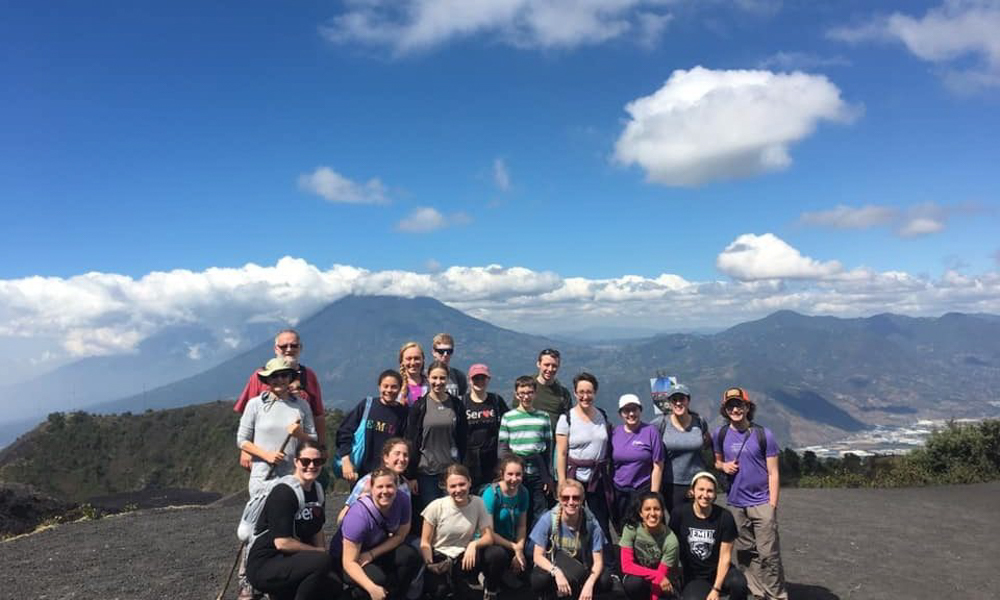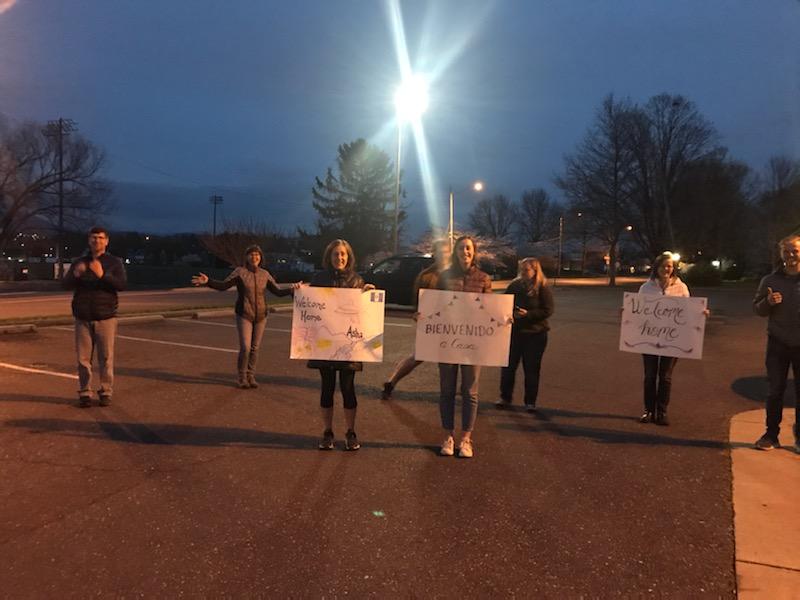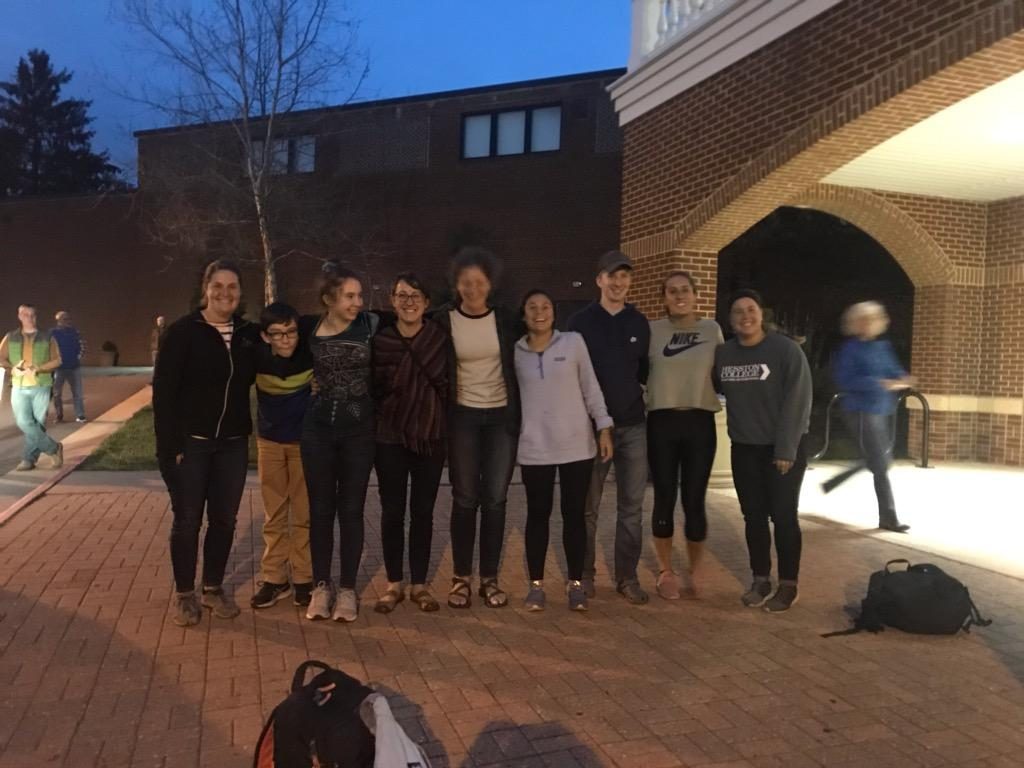Enduring two border closures and rapidly changing plans impacted by the expanding COVID-19 outbreak, EMU’s Guatemala/Colombia spring cross-cultural group arrived back in the United States Tuesday on a special U.S. government charter..
Departing from Guatemala City, the flight included other U.S. citizens who had been trapped by the sudden March 16 border closure.

The group of 18 — 14 students, two children, and leaders Professor Laura Yoder and Peyton Erb — had spent the previous week waiting at Seminario Anabautista Latinoamerica, known as Semilla.
Sophomore Julie Crouse, interviewed by The Weather Vane, said all the seminary employees were sent home, which meant the temporary residents did chores and cooked for themselves. “We are lucky to be together and in such a beautiful place for the week,” she said.
For more on the Guatemala cross-cultural, follow this link to The Weather Vane‘s coverage.
From their Miami destination, a few of the group caught connections straight home. The remainder arrived, weary but smiling, back to campus at around 8 p.m., greeted by a welcome party of sign-bearing friends, family and administrators.
Director of Intercultural Programs Beth Good, President Susan Schultz Huxman and Provost Fred Kniss were among the welcome party, all playing an important role the past several days in mobilizing action to help get the group home.

Along with managing other logistics related to COVID-19 response on campus, the trio kept in touch with Yoder and updated parents daily about progress to circumvent the border closure and bring the group home.
These efforts included emails and calls to Virginia representatives and senators and the State Department. Several EMU Board of Trustees members also leveraged contacts on behalf of students from other states.
In one email to parents, Huxman noted, “The day began with a flurry of activity with our contacts in the Virginia statehouse, alumni influence in other local and state governments, and urgent conversations with several private aviation companies that were prepared to charter them home! I learned a great deal about international aviation today!”
Good is thankful to have the group safely home and expressed appreciation for the leadership of Yoder and Erb as well as the resilience of the students.
“Continue to pray for Canadian Mennonite University students who are still awaiting flights out of Guatemala,” she said. “We hope they can come home soon, too.”
Disruption not a rare occcurence
While a global pandemic is a rare event, several of EMU’s crosscultural groups have encountered other disruptive events in the program’s 30-year history. Here’s a short list, contributed by former program directors Vernon Jantzi and Don Clymer, and current program assistant (and former interim director) Linda Martin Burkholder:*
Seismic activity
- The 2008 Sichuan earthquake, a magnitude 8.0 event that killed 70,000 people, disrupted travel plans of the summer China group.
- An Ireland/Europe group had their air travel changed during the 2010 Eyjafjallajökull volcanic eruption in Iceland.
- Don Clymer led several trips to Guatemala and Mexico and remembers being in the region during a period of seismic activity. A volcano exploded right before their arrival. “We experienced several earthquakes and eruptions in Guatemala and two fairly major ones in Mexico—one when we were on the top of the largest skyscraper in Mexico City,” he recalled.
Sept. 11, 2001
Clymer began as director in August 2001, and shortly after, experienced his first major challenge as program administrator. After the attacks on the World Trade Center and the Pentagon, air travel shut down for two days.
A group in France, led by Carroll and Nancy Yoder, was preparing to go to the Ivory Coast. Clymer communicated with understandably concerned parents, and consulted with the leaders and with administration. In the end, the consensus was that the group was safer where they were rather than to travel immediately back to the United States.
Political unrest
A group led by Jim and Doris Bomberger was travelling during the 1989 Tiananmen Square crisis in China, “Our group was quite affected by that and had to make significant changes,” said Jantzi.
Jantzi also recalls arranging a semester in Costa Rica (before the formal crosscultural program began) for two students, both of whom were arrested for taking photos of a political protest.
“I was working with the Costa Rican government at the time and fortunately could ask President Rodrigo Carazo the next day to recommend the person with whom I should speak to get them released,” Janzi said. “However, he called the appropriate person himself and the students were released sometime that day, but they had spent the night in jail.”
Via Facebook, Robert Kanagy says the 1990 Gulf War limited the Middle East group’s travel. “We were not allowed into Jordan,” he wrote.
*We know longtime former director Ann Hershberger could add to this list, but didn’t want to distract her from her work as interim associate director of Mennonite Central Committee.

View cross-cultural posts at: https://emu.edu/now/crosscultural/2020/04/06/on-leaving-guatemala/
3.31.20 by Andrea Troyer
“What does it mean to pack up your bags and go somewhere new? To leave family, friends, school, your way of living… and just restart in a new place, a new country perhaps? Well, these were my thoughts when we first left the United States in January, and I had similar feelings as we left Guatemala for Colombia this week.”
…
I started planning this blog post entry at the beginning of March.
Oh, how the tables have turned.
So, let’s restart.
What does it mean to be stuck in quarantine during a global pandemic? Not being able to see family and friends, an empty EMU campus, a quiet city, and confusion and worry throughout the world?
We are currently in unmarked territory, and of course, our cross-cultural group was in Guatemala when this all went down.
As of March 15, we officially knew our Colombia plans were cancelled because of COVID-19. The organizations thought it would be unsafe to have foreigners in the national capital, so we decided to change our plans and stay in Guatemala for the remainder of the semester. It was around this time that my free travel group changed our anticipated plans from Belize to Lake Atitlán within Guatemala because we feared that the borders would close within the week we were gone for Community Learning (March 17-21).
March 17 was a tough day. I said goodbye to my host family for the last time and arrived at CASAS sort of ready for a week of community learning. We were supposed to be joining Canadian Mennoite University for the service week, but their group decided to end their trip early and travel back to Canada due to COVID-19. Our EMU group decided to continue in the community learning week and we split into smaller groups and departed our separate ways Monday morning. I personally was travelling to Lake Atitlán. I was thrilled to get out of the busy cityand have some personal space from the group until Saturday.
Oh, how the tables turned yet again.
On our way to Lake Atitlán, our driver pulled over along the road and the CASAS leaders were talking quietly in the front. The rest of us in the van were confused about the unexpected stop.
“What’s going on?” someone asked. A few minutes later, we heard a response.
“President Giammattei had a national announcement this morning. The Guatemalan government closed its borders and the organizations at the lake do not want you guys coming out, so we are turning back around to CASAS” said one of the leaders.
“Oh.” That was all I could think of.
I just said goodbye to my host family, and now I’m not going to Lake Atitlán for the week? What’s next? There were a lot of emotions in the van on the way back. For me, I got that terrible feeling and that I denied the whole ride back to the city.
“We’re not going home. There’s not that many COVID-19 cases in Guatemala. We can still do other things for the next six weeks. This is my cross-cultural experience. I don’t want to leave now.” I kept telling myself.
We learned that afternoon that we were departing back to the states as soon as we could get a flight.
…
But I didn’t want to leave Guatemala. Not. one. bit.
Now, I feel heart broken. I keep asking, “God, why was my cross-cultural experience cut short?” or “Was this REALLY in your plan for me?”
Today is March 31. It’s the day we should have left for Colombia, but instead, we had our first cross-cultural Zoom meeting in our individual American homes. I was so happy to see my group friends and catch up with their re-entry experiences, but it didn’t feel completely right. I’m used to having meetings in the Guatemalan atmosphere. Are we really taking cultural learning classes through the computer for the upcoming weeks? When I first thought about writing this post, I thought we would be in Colombia now. I was not thinking THIS would be my reality.
“What does it mean to pack up your bags and go somewhere new?”
Change. A LOT of change. And I pray that God will be with us throughout this unknown journey and that he will guide our feet towards his light.”
-Andrea Troyer